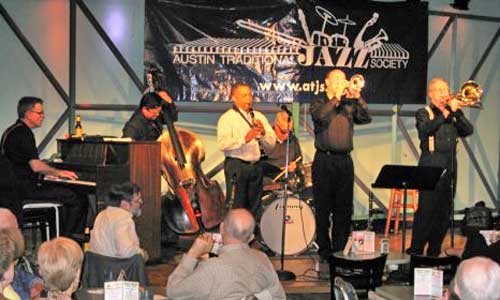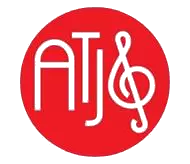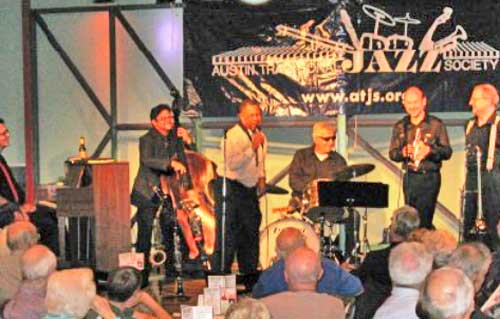Elephant (in the) Room
By Dan Augustine
All right, my friends, i’m going to try to acquaint you with the enormity of your error if you were not present at the concert last Sunday (November 16, 2008) by the Mission City Hot Rhythm Cats, who played at the Capital City Comedy Club in Austin, Texas, as part of the series of traditional jazz concerts hosted by the Austin Traditional Jazz Society. The band’s website is at http://missioncityjazz.com/.
 |
To do this, i’m going to have to resort to analogies, which are always suspect, but frequently the only way to give person B an idea of what person A knows about. For example, say you saw an elephant, but your friend has only ever seen a mouse. Yes, you could tell him that both animals are grey, have a nose and a tail, are rather round in shape, and the elephant is bigger, but that really doesn’t do it, does it?
Well, the Mission City Hot Rhythm Cats (hereinafter abbreviated to MCHRC) are kind of like elephants. Didn’t work, did it? Let me try again.
Everybody has some musician friends who play instruments, and sometimes enough critical mass of players is achieved, with the right instrumentation, to allow them to put together a band, which is mainly just for kicks and plays at local events for no money. Eventually they may get good enough to attach a name to their group, and maybe get a gig at a local bar or restaurant. After a while, they start to get better known around the city, attract a following, and are mentioned in the newspaper. In time, they start playing in other cities in the area and then the region, and then the state. If they are really very good, after a while they begin to garner attention nationally, and perhaps go on tour or get paid to appear at jazz festivals in other states. And after a number of years doing this, they go on tour internationally, and after decades become an icon, an exemplar of a style of music. So, seen this way, bands may be regarded as a ‘friends’ band, then local, neighborhood, city, area, regional, statewide, national, international, and timeless.
Not surprisingly, given their individual histories, MCHRC is (in my opinion) already up to the level of an excellent regional band, and pretty soon they’re going to be statewide and national in reputation. That’s what you missed. They’re that good. These guys are pretty close to the Jim Cullum level, and rising. And they didn’t just fall off the turnip truck, either, but individually have a decades-long history of playing and recording traditional jazz in Texas and New Orleans, working with the best players in both areas. Lemme ‘xplain:
The band’s personnel is as follows: David Jellema (co-leader, cornet, clarinet), Mike Pittsley (co-leader, trombone), Pierre Poree (clarinet, alto saxophone, vocals), Mark Hess (piano), Tim Paco (bass), and Ed Torres (drums).
David Jellema (cornet, clarinet) played with traditional-jazz bands in the Washington DC area from age 13: Southern Comfort, Buck Creek, Storyville Seven, Last Chance Jazz Band, Bay City Seven, Federal Jazz Commission, and the New Traditonal Jazz Band. He also has a BA in Classical Civilizations and has worked in Egypt with Horn of Plenty refugees and in northern Iraq and southeastern Turkey with Kurdish refugees.
Mike Pittsley (trombone) grew up in northern California and in 1978 joined the Jim Cullum Jazz Band, appearing in over 100 broadcasts of Riverwalk, Live from the Landing, as well as playing on many Cullum CDs over the years. He teaches low brass in the San Antonio area and also holds a commercial aircraft pilot’s license.
Eddie Torres (drums) also played with the Cullum band (1984-2000), and is a devoted fan of Gene Krupa and Zutty Singleton.
Mark Hess (piano) is another Cullum alumnus (hear him play trombone on the Happy Jazz LPs of "Happy Landing" and "Listen Some More"), and also in 1975 won the prestigious Texas Ragtime Championship.
Pierre Poree (alto sax, clarinet, vocals) hails from New Orleans, but he relocated to San Antonio to escape hurricane Katrina. In New Orleans he played and sang regularly with local bands, and has continued doing so in San Antonio, where he is also a music educator.
Tim Paco (string bass) is a San Antonio native who worked for years in New Orleans, and has played bass, tuba, and sousaphone there with Pete Fountain, Connie Jones, Bob Havens, Tim Laughlin, and Matt Perrine among others.
So what kind of gumbo do you get with these ingredients? Well, you got your San Antonio roux (Pittsley, Hess, and Torres all played with Jim Cullum for decades, and Tim Paco is a native). Then there’s the New Orleans influence with both Pierre Poree and Tim Paco. Add a hefty dollop of East Coast with David Jellema (Washington DC) and Ed Torres (New York City), and finish off with a soup on of Sacramento (Pittsley grew up around there) and West Coast styles. Stir, and you get a fine blend of flavors that change the way you hear each song. Moreover, these are not only highly experienced musicians with great technical mastery over their instruments, they build on top of that by being enterainers as well. If you want to put on a great show, you can’t get up there and just play notes, you have to connect with the audience with showmanship.
The first set opened with "Swing That Music" (which you can hear of sample of at http://missioncityjazz.com/Sound%20Clips.htm), with each player taking a solo. About Ed Torres’ solo, what the MCHRC-website said about his playing is appropriate here: "Eddie has now achieved his own notoriety in the jazz world. Many of the greatest drummers in the business today have stood in awe and marveled at the techniques Eddie effortlessly employs to propel a jazz band to new levels of musical excitement and drive." The next tune was perhaps intended to stretch our ears a little (elephants have pretty big ears, you know): "Bernie’s Tune", an old straight-ahead jazz favorite from the 1950s (catch a great version of it on YouTube with Gerry Mulligan at http://www.youtube.com/watch?v=5k0FS3VszT4), with Tim Paco using some double-stops in his fine bass solo. "Somebody Stole My Gal" took us back to more traditional fare, with a good beat and Pierre Poree doing a solo and a great vocal (even if he did forget some of the words).
One of Turk Murphy’s aims in a concert was to entertain both the audience and the band by playing "one for them, then one for us". MCHRC did the latter by dipping into some New Orleans history with an old Sharkey Bonano tune called "Git-Wit-It". David Jellema then traded his cornet in for his clarinet in "Poor Butterfly", which got a lot of couples out on the dance floor. Eddie Torres then demonstrated how to play a New Orleans street-beat on drums behind "My Gal Sal" (to which ATJS President Tom Straus, a banjo-player, responded that MCHRC was "co-opting a lot of banjo-club tunes"). The set ended with more fine drum-work in Duke Ellington’s "Caravan".
During the intermission, ATJS vice-president Dave Stoddard made some announcements, including the fact that one of our favorite clarinet-players, Rose Imperato, will be playing a final time this Friday at the Carousel Lounge with the Chaparral Dixielanders before decamping with her husband Artie for the wilds of New York City. Then our own Ben Conroy favored us with a number of boogie-woogie tunes on piano.
Before the second set started, the band played "Happy Birthday" to Dave Stoddard, whose birthday today it was, and the crowd joined in to wish him a happy 39th birthday (but which 39th was not vouchsafed to us). The set was devoted to songs associated with Bix Beiderbecke, and it should be noted that David Jellema brings a special authenticity to his performances of the music associated with Bix. In 1999, the Bix Beiderbecke Memorial Society reported that the Jellema’s band (The New Traditional Jazz Band from Maine) at that year’s festival had "the most faithful Bixian sound and style" of all ten bands there. They continued that "one of the highlights of the Festival was David Jellema’s reading on Sunday afternoon at LeClaire Park of the poem ‘Bix Beiderbecke Composing a Suite for Piano, 1930-1931: mist, candlelights, cloudy, flashes, dark’ by his father, Rod Jellema." (http://ms.cc.sunysb.edu/~alhaim/
BixBeiderbeckeMemorialSociety.htm)
The band played "Since My Best Gal Turned Me Down", with a good beat and alternating fast and slow tempos after the solos. (Several glosses on this title were also mentioned, such as "Since My Best Gal Turned Me In".) Mike Pittsley had a forceful trombone solo on "Rhythm King", and "Susie" showed off the nice chord-changes of that tune. A less frequently played song was "Blue River", with Jellema on clarinet, then a section without rhythm of clarinet, sax, and trombone. "Clarinet Marmalade" in a fast 4 with a good beat followed, and one of Bix’s best-known tunes, "Singin’ the Blues" featured a very Bixian cornet solo by David Jellema. The last tune of the set, "Sensation Rag", showcased Mike Pittsley’s trombone solo, which at times reminded me of the solos that Abram (‘Abe’) Lincoln used to play. Mike later told me that this was no accident, as he is working on a website on Abe Lincoln (http://www.abelincolntrombone.com/).
The last set delved back into traditional songs, with "Dixieland One-Step" (another fine drum solo by Ed Torres), and Pierre Poree showed what an expressive song-stylist he is with a vocal on "What a Wonderful World". The little-heard "Weary River" was next (garnering the Elmer Fudd pronunciation-award of the day, according to the band), and David Jellema displayed some nice plunger work on his cornet solo. "Struttin’ with Some Barbecue" had an infectious beat, and Mike Pittsley is the first right-handed trombonist i’ve ever seen suddenly switch his bell around to play the slide with his left hand, an amazing bit of dexterity that he explained was due to some kind of cramp in the fingers of his right hand. The concert ended with an old favorite, "Tin Roof Blues", featuring both Pierre Poree and David Jellema on clarinets.
After Jellema’s final introduction of the band, the crowd rose almost as one and gave them a standing ovation, as well they should have, as it was one of the best band and best concerts we’ve seen since, um let’s see, probably the last time Jim Cullum played for us. The Mission City Hot Rhythm Cats said that they’d like to play for us again, and you can be sure that they will, and soon.

